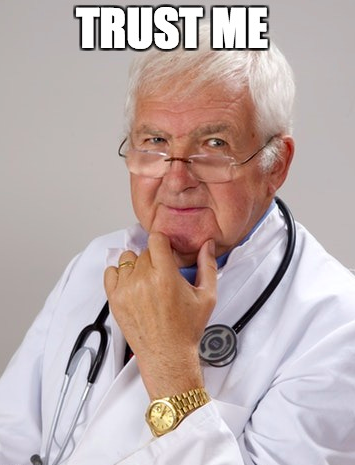How You Should Use Critical Thinking To Make Better Life Decisions
Critical thinking is unsexy because it’s in university syllabuses.
Okay, I never thought I’d write an article about critical thinking. Ugh.
Critical thinking is unsexy because it’s in university syllabuses.
Rule of thumb: if your high school teachers preached it to you 15 years ago (don’t lie and tell me you understood WTF pemikiran kritis dan kreatif was), and your university books have a chapter on it — it’s definitely not sexy.
But actually, critical thinking is critical to leading a good life. If only they had called it something like:
“How to spot bullshit, and make decisions that will drastically improve your life.”
Then maybe they’d have our attention. Because that’s what really critical thinking is. And today, we’ll explore why it’s so important and how to use it in our lives.
Why critical thinking? Because there’s a lot of BS out there.
Here’s an example of what critical thinking is not. This might be familiar if you have annoying relatives in your WhatsApp groups:
- Sally, our heroine sees 2000s-era video of three people (bonus points if they’re Asian) in doctor’s coats talking about how drinking lime water makes you slim, increases your IQ, and makes you live forever.
- Sally immediately sends video to the five WhatsApp groups she’s in. “Good sharing for health.”
- Sally starts putting lime into every bit of water within one square kilometer of her kitchen sink. We’re unsure about the results of the “slimming” water, but it’s certainly not very obvious.
But this is a rant against the filters we set for ourselves on the information we allow in our lives. There’s a lot of “information” out there in the world, but unlike good ol’ Aunt Sally — many sources don’t have good intentions.
Maybe they’re trying to sell you something. Maybe they’re pushing a political agenda. Maybe they’re trying to take over the world by stimulating lime-juice-triggered brain cells that will now obey the Jewish Illuminati’s commands (yes, if you don’t practice critical thinking, you start to believe all kinds of crazy conspiracy theories).
The mainstream media has many creative names: fake news, alternative facts, opinions — but let’s call it out for what it is. Bullshit.
The world is full of it, but maybe critical thinking can save us.
We’re all very susceptible to BS. How do we know what’s right and wrong?
How can I tell with absolute certainty that drinking lime water will not make you live forever?
But you say, “Stop being an intellectual snob, Aaron. You think you’re so smart, but I drank lime water for three months — then I lost 0.9 kg and it cured my cough! Who are you to call it bullshit!?”
It actually starts with a very counter-intuitive step.
To become a good bullshit detector (a.k.a. critical thinker), we first need to realise that we’re all naturally bad at thinking
Cue wise, deep voice:
To become a rational thinker, we must first realise we’re irrational.
Because ironically, most of what allows fake news to thrive originates within us. For example, some people refuse to vaccinate their babies. You and I probably think it’s ridiculous (because we’re exposed to science, but perhaps more importantly, most of our friends and families do vaccinate their babies).
But what if you lived in a small community where:
- Your local religious leader says immunisation is against your holy book (authority bias)
- All your close friends don’t vaccinate their kids (bandwagon effect)
- They show anti-vaccination conspiracy videos at all social gatherings (illusory truth effect)
Would you be as willing to vaccinate your kids as you are today? Despite the overwhelming amount of science proving it — I know it’d still be difficult for me.
That’s just one example where cognitive biases affect our decisions. But the hard truth is, our biases (the demons that make us bad at thinking) are always with us; constantly screwing with our decision making. Can we ever be fully rational thinkers?
Unfortunately, no. But at least by recognising our biases, we can start deliberately fighting to make our decisions better.
But recognising biases is just one aspect of becoming a critical thinker. Another important aspect is learning to question effectively, and discovering root causes.
For inspiration, let’s take everyone’s favourite modern-day hero: Elon Musk. Elon Musk is awesome because he’s a billionaire, he does crazy things like building electric cars and rockets, and he’s even the inspiration for Marvel’s Tony Stark character.
One of Elon Musk’s favourite thinking methods is something called First Principles. In his own words:
“First Principles is a… way of looking at the world. You boil things down to the most fundamental truths and say, ‘What are we sure is true?' and then reason up from there.” – Elon Musk
Not all of us are going to use First Principles to become great inventors like Mr. Musk. But we can all learn something from this process — asking questions until we get to the root of things.
For example, here’s one of my favourite things to talk about: should you buy a new car?
And my line of internal questioning might go something like this:
1. Why do you want to buy a new car?
Because I need a car to get to work.
2. Is it really true that you need a car to get to work? What about public transport, Grab, or even a motorcycle?
Motorcycles are dangerous. Grab is more expensive than owning a car. Public transport is just… troublesome.
3. So it’s not just about getting to work. It’s about getting to work in the safest and most convenient way, right? But is the inconvenience really worth the huge costs? Are you sure that’s your only motivation?
Of course it’s not just about getting to work; I want it to be safe and convenient too. Okay, if I’m being really honest, it’s also because I like owning new things, and having a nice car shows people I’ve “made it.”
4. Why do you need to show people that you’ve “made it”? What value does that bring to you?
Hmmm… I haven’t thought about that so deeply yet. But all the successful business people I know drive nice cars. And all the fabulous people on social media…
5. But you know that appearances on social media can be made up right? And how sure are you that the “successful” people you’re talking about aren’t deep in debt because of their nice cars?
Go away — I don’t like talking to you.
Asking a series of basic questions can quickly make you sound like an a**hole (so maybe use it sparingly with people - unless they’re asking you for advice?). But it’s a great internal process to help you find out root causes.
Examine motives. Because similar to how every situation has a root cause, every person has a motive.
If we think about it, apart from naturally-occurring things like the wind blowing — almost everything else is caused by people decisions. Which is in turn caused by their motives.
As James Altucher says, “There’s always a good reason, and there’s always the real reason.”
Part of being a great critical thinker is learning to look for the real motivations behind what people do. For example:
- If your parents are nagging you 20 times a week to get married, is it because they don’t want you to grow old and die alone (highly likely), or is it because they like tiring wedding ceremonies (less likely).
- If your unit trust agent calls you weekly to have coffee, is it because she thinks you’re handsome, or is it because she gets a free holiday to Barcelona if she meets her sales target?
- If your manager keeps micro-managing your work, is it because he’s a bona fide a**hole, or is it because you haven’t proven yourself worthy of his trust?
Of course, most of us aren’t mind-reading experts who can read people accurately. We’re normal people with biases. So even our evaluations of motives and root causes will be wrong sometimes. Maybe a lot of the time.
But like any other skill, the more we practice, the better we’ll get at it.
What do I do if I need to make a decision but am feeling overwhelmed by a mountain of data?
Have you ever felt overwhelmed by the huge amount of information you’re bombarded with every day? I know I have. And I’m a blogger — so I’m actually supposed to be good at managing large amounts of data.
The quickest way would be to fall back to trust.
Like if you asked me quickly — what news sources do I trust? The New York Times, Washington Post and BBC would be on that list. This isn’t to say they’re perfect, but if I have only five minutes to check, and it’s on the Washington Post — I have enough faith in their reputation, standards and ethics.
But trust is a dangerous thing, especially if it’s just from one source. If you have a little more time, a process called triangulation is more useful.
In triangulation, we use multiple sources to check on the same thing. And we use our knowledge on “trusted sources” to narrow it down. For example:
- If you search for “Money Game,” and only one of the Top 30 (I usually go through the first 3 pages of Google) results supports Money Games, and it’s an anonymous blog full of bombastic promises, over-smiley men in suits, and dodgy advertisements — you probably can’t trust it.
- If you search for “Is Bitcoin a scam” and 30 publications/newspapers including CNN, Forbes, CNBC (and reputable blogs like mr-stingy!) have covered it — you can probably be more confident.
Interestingly, we’re really good at finding data to support what we already believe (confirmation bias). So it’s important to also look for data that goes against what we already believe. To try and understand all sides of an argument.
I realise the above is really just common sense. But in our age of lazy thinking and fake information, common sense apparently isn’t that common anymore.
Here's the final part: taking action. Because what good is it if you have the greatest strategies in the world, but don’t do anything with it?
Don’t let trying to make a good decision paralyse you from making any decision at all.
I write this from personal experience. I’ve always been a very analytical and calculated decision-maker. But that also means I’m not spontaneous and have often missed out great opportunities — because I’m so afraid to make wrong decisions.
Don’t be like me. Because apart from sorting through all the data the world gives us — you need personal experience too. And you only get that by making decisions, taking action, and facing the consequences. Everything you critically thought out was just theory — now test it out and see what happens?
Then reflect on your experiences and check if you need to modify your thinking. Yes, it’s really a never-ending process of thinking - action - feedback. And done right, it can incrementally improve your life.
An iPhone engineer might call it an improvement cycle.
I’d like to think it’s the circle of life.
The full article originally appeared on mr-stingy.com.
This story is the personal opinion of the writer. You too can submit a story as a SAYS reader by emailing us at [email protected].

